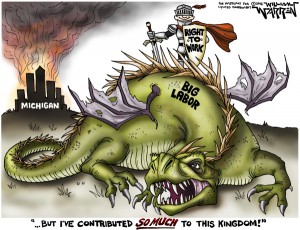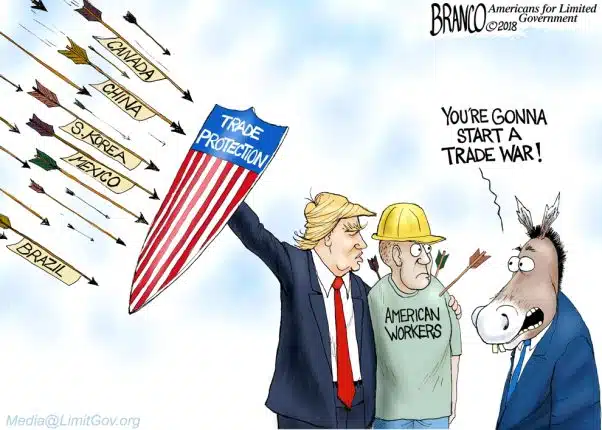
In 2011, only 14.8 million workers belonged to unions or 11.8 percent of the workforce and only 6.9 percent of the private employer workforce was represented by unions. And the report for 2012 which is expected to be released later this month is expected to show an even further erosion in the number of workers, particularly in the private sector, who belong to a union.
The shift of the composition of Big Labor is the only way to understand the political decisions that they make.
Labor unions used to be made up of blue collar workers who extracted natural resources, and then turned those natural resources into manufactured products. They used to be primarily people working heavy machinery, building skyscrapers, and operating our nation’s trains, trucks and working in the ports.
Now, more labor union members work for the government at all levels than work in the private sector with 37 percent of government workers belonging to unions.
This explains why even though the United Mine Workers (UMW) refused to endorse the Obama presidency given their hostility to the mining industry, their former President Richard Trumka, who now leads the AFL-CIO, became a leading advocate for Obama’s re-election.
While the UMW makes up a part of the AFL-CIO, they are swamped internally by the public employee union members.
As a result, Big Labor is no longer primarily concerned with worker issues, but instead is consumed by growing government. With 37 percent of every public employee unionized, Big Labor has a vested interest in expanding the size and scope of government to offset their continued membership losses in the private sector.
This is why last year’s stunning loss in Wisconsin on legislation allowing public employees to choose whether to pay dues to the union that represents them sent terror into the hearts of Big Labor. Increasing the number of dues paying government employees has been job one in filling union treasuries in the face of the gradual thirty year decline of their private sector presence.
Reports out of Wisconsin show that the Wisconsin chapter of the American Federal, State, County and Municipal Employees union (AFSCME) registered a more than 50 percent membership drop in the first year that the state reform was in place.
Very simply, when labor union members are given a choice of whether to send in dues money rather than having it automatically deducted from their paychecks by the government, union members vote with their checkbooks.
The spiral effect of this phenomena is that as public employees choose to not pay dues, the ability of the union’s to have resources to promote the growth of government diminishes as well.
In point of fact, the balance of power shift is as simple as the numbers. A little more than 30,000 Wisconsin public employees stopped paying into AFSCME last year. If they formerly had paid just $25 a month in dues to AFSCME, this is a $9 million drop in revenues for the union in this one state alone.
That is $9 million not being spent on political organizing for big government candidates, and not being funneled into political and “educational” organizations designed to promote the big government agenda.
This is the impact of providing public employees a simple choice in one union in one medium sized state.
With Republicans in full control of both houses of the state legislature and the governor’s mansion in 23 states in 2013, the prospects of many of these states following the same path are good.
This hit to organized labor’s bottom line through their public employee cash cow, combined with private sector workers being allowed to choose whether to join a union or not in both Indiana and Michigan last year, makes 2013 a year where the legal advantages provided organized labor in states across America may be leveled permanently.
The resulting financial impact on the nation’s largest unions and their ability to fund the political infrastructure of the left is likely to be felt most acutely in the national election of 2016 and beyond.
This changed political dynamic promises to diminish Big Labor’s influence and increase the likelihood that our nation’s lawmakers will finally tackle our overwhelming fiscal crisis with real budget and personnel cuts, free from the self-promoting public employee union juggernaut that has led our government’s to near bankruptcy.
Now it is up to state legislatures across the country to pick up on the work in Wisconsin and at the very least, stop using the government to collect public employee union dues through payroll deductions and allow public employees the freedom to decide if they want to pay them for themselves.
Rick Manning (@rmanning957) is the vice president of public policy and communications for Americans for Limited Government.






